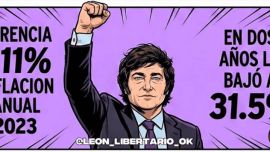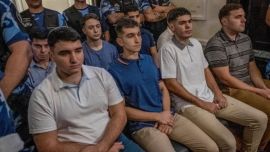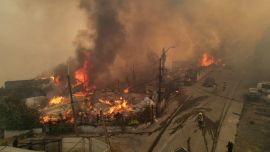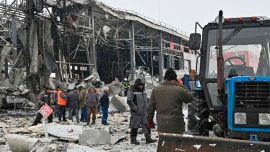Like much else in the time of coronavirus, governing as a global leader attending high-level summitry has been unceremoniously upended.
Thursday’s virtual meeting of the Group of 20 nations, with more than a dozen heads of state participating, was less a global summit and more of a high-powered conference call. It lasted about 90 minutes — the same as a standard football match — instead of the usual two days.
Hangzhou, Hamburg, Buenos Aires and Osaka had been the hosts for the previous years’ gatherings. For 2020, it was to be Riyadh, Saudi Arabia.
Chaired by Saudi King Salman, who is presiding over the G20 this year, the meeting's purpose was to tackle the pandemic and its economic implications as people lose their incomes amid closures, curfews and lockdowns.
In opening remarks, the Saudi king said, “This human crisis requires a global response. The world counts on us to come together and cooperate in order to face this challenge."
“The unprecedented Covid-19 pandemic is a powerful reminder of our interconnectedness and vulnerabilities," the group said. “The virus respects no borders."
UN Secretary-General António Guterres urged G20 leaders to adopt a war-time plan to tackle the pandemic.
“It took the world three months to reach 100,000 confirmed cases of infection,” he said. “The next 100,000 happened in just 12 days. The third took four days. The fourth, just one and a half.”
“This is exponential growth and only the tip of the iceberg,” Guterres said, adding that countries must be able to combine systematic testing, tracing, quarantining and treatment, as well as coordinate an exit strategy to keep it suppressed until a vaccine becomes available.
UN spokesman Stephane Dujarric said later that the secretary-general “thought the meeting was an important step in the right direction, but there’s still a long way to go for truly concerted and effective global leadership in response to this pandemic and its impact.”
The WHO director-general, Tedros Adhanom Ghebreyesus, told the G20 leaders: “We are at war with a virus that threatens to tear us apart — if we let it.“
He urged leaders to fight without excuses, without regrets, thanking countries that have already taken steps to fight the pandemic and urging them to do more. He also encouraged leaders to unite, saying no country can fight Covid-19 alone.
British Prime Minister Boris Johnson announced during the call that the UK was providing additional funding to the Coalition for Epidemic Preparedness Innovations, which is supporting the development of vaccines, bringing its contribution to 250 million pounds (US$302 million).
Little boxes
In the video call, world leaders like India's Narendra Modi, Japan's Shinzo Abe and Canada's Justin Trudeau, whose wife has contracted the virus, could be seen in little boxes on a screen seated at desks in photos shared on Twitter by European Council President Charles Michel.
US President Donald Trump was shown seated at the end of a long conference table in Washington with other US officials in photos shared on social media by the Saudi Foreign Ministry.
"We talked about the problem. And hopefully it won't be a problem for too much longer," Trump said about the call. "The United States is working with our friends and partners around the world to stop the spread of the virus.
But coming together never seemed more of a metaphor than it did at this particular “gathering.”
Extraordinary images emerged on social media of conference call gallery shots — the kind that legions around the world, pushed into working from home, have become accustomed to seeing in recent days.
Instead of unshaven or dressed down colleagues, there were US President Donald Trump, Japan's Prime Minister Shinzo Abe, India's Narendra Modi, French President Emmanuel Macron and Canada's Justin Trudeau, Russian President Vladimir Putin, Turkish President Recep Tayyip Erdogan, among others, interacting in pixels with the Saudi monarch.
Erdogan called on G20 leaders to use all available “humanitarian aid financing resources” to help Syrians and other people in war-torn regions, who are most disadvantaged by the outbreak.
“I invite all countries to participate in the fight against this global health crisis in a just manner until all of humanity can breathe easily,” Erdogan said.
Putin suggested setting up a special fund under the IMF that would offer interest-free loans, and he emphasised the need to create “green corridors” for free movement of supplies and technologies intended to deal with the pandemic. He also proposed a moratorium on sanctions with regard to essential goods.
Putin noted "it's a matter of life and death," emphasising the need to get rid of “political rubbish.”
He did not name any specific country but appeared to refer to US sanctions on Iran, which has been badly hit by the outbreak. Russia has also faced waves of Western sanctions over its 2014 annexation of Ukraine's Crimea.
Lone ticker
Instead of wall-to-wall live video coverage and photographers' cameras snapping, the only indication the virtual summit had started was a lone ticker on Saudi TV.
The virtual G20 summitry makes transparency even more of an issue. There were no media briefings where journalists could ask probing questions of leaders or their deputies. There were no aides walking the sidelines, available to the news media to clarify, add context and answer probing questions.
For Saudi Arabia, this was not what it expected or wished. When its crown prince, Mohammed bin Salman, attended the G20 summit in Argentina at the end of 2018, it was largely as a pariah. Video showed him standing alone, apart, after global revulsion at the slaying of journalist Jamal Khashoggi at the kingdom’s consulate in Istanbul. The blame from many quarters was resting firmly at his door.
Then came some salvation: Russia’s President Vladimir Putin steadfastly made his way to bin Salman, and they exchanged a robust high-five with a wide smile. For better or for worse, these are the types of personal moments that define high-level summits.
There was no such moment Thursday. There were only pixels and screens, digitised audio and leaders in rooms scattered across a beleaguered planet. When the world's leaders came together on Thursday, they did it separately. And then — with no ceremony, no meal, no shared group photo — they hung up and went about their ever more uncertain days.
by Tamer Fakahany, Aya Batrawy & Edith M. Lederer, AP


















Comments